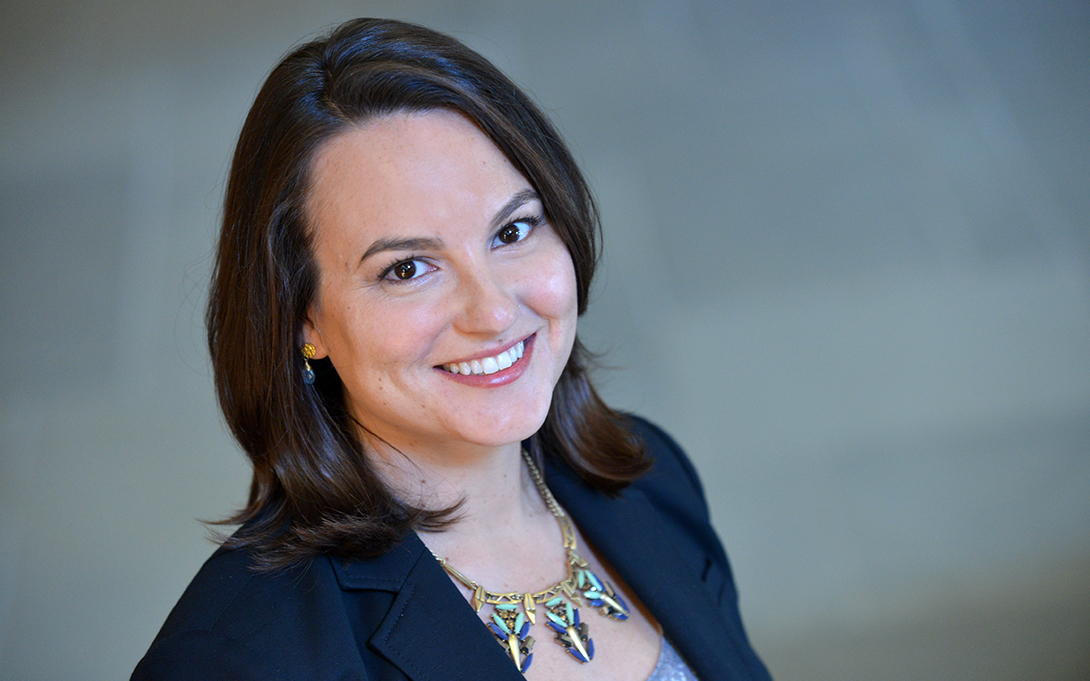
The Ford School is delighted to announce that a number of faculty members will join our community this fall. To introduce them to the Ford School and University, we’re running weekly Q&As throughout the summer that touch on their policy and personal interests alike.
Here’s Kaitlin Toner Raimi on extreme views about the environment, the pitfalls of belief superiority, behavioral interventions, cheesy murder mysteries, dancing through college (and beyond), and more.
Q: Tell us about one of your current studies.
Toner Raimi: Recently I’ve been studying what I call “belief superiority” – people’s belief that their own viewpoints or opinions are more correct than alternative views. We’ve found that the more extreme people’s attitudes are on a given topic, the more they tend to think that their own view is superior.
In a recent study of beliefs about hydraulic fracturing policy, not only did we find that people with more extreme views on fracking (in either direction) felt more superior about those views, we also showed that people who felt superior tended to engage in more “motivated reasoning” – seeking out and remembering information that conformed to their existing views. They also tended to vilify their opponents more than people who felt more humble about their beliefs.
From a policy perspective, this matters because some people may just be so sure of their own superiority that they would never be swayed by new information. They may dismiss anything (or anyone) that doesn’t conform to their beliefs as not just unhelpful to their argument, but incorrect.
Q: What’s next for you on this topic?
Toner Raimi: Now we’re trying to explore who tends to feel superior and what that means for their interpersonal relationships, their reaction to persuasion or political campaigns, how they are seen by other people, how effective they are in debates, etc. We’re also curious about whether there are ways to reduce this feeling of superiority and get people to consider alternative views. There are a lot of unanswered questions still to be explored!
Q: Tell us about a policy in your area of interest—something you love, hate, or find intriguing.
Toner Raimi: Lately, I’m very intrigued by the EPA’s Clean Power Plan. The proposed rules explicitly mention demand-reduction (energy efficiency) as one of the ways for states to meet carbon reduction goals. The rules are broad enough that states may use behavioral demand-reduction strategies to get there. That opens up the door for a lot of the existing behavioral work on energy efficiency to be put into practice at scale. It could also create new and exciting opportunities for behavioral research beyond what academic social scientists are usually able to get their hands on.
I recently helped organize a workshop, “The Clean Power Plan: Health, Energy Demand, and Economic Effects,” at Vanderbilt University that explored these issues. I was lucky enough to chair a panel with some experts on this very topic. My sense is that a lot still needs to be hammered out with the Clean Power Plan regulations, but there are some really exciting possibilities. I’ll be very curious to see whether and how states choose to make behavioral programs part of their implementation plans.
Q: What courses do you plan to teach in the coming year?
Toner Raimi: Next year I’ll be teaching a course called “Psychology of Environmental Behavior”—one version for graduate students and another for undergraduates. This course will examine the social and psychological factors that influence how people think about environmental issues (especially climate change, but also things like fracking and water consumption) as well as some of the motivations and obstacles that policymakers should consider if they want to change people’s environmentally-relevant behavior. Even though the course will mostly focus on the environment, my goal is to introduce students to some of the non-economic or technological tools for behavior change that can be applied in many different domains.
Q: Tell us something about your life outside of academia. What’s your favorite TV series?
Toner Raimi: I have a not-so-secret (but very guilty) love of British drama shows, especially cheesy murder mysteries. Think Agatha Christie adaptations or anything with the word “Inspector” in the title. Or really everything that’s ever been on Masterpiece Theater. I’m pretty sure Netflix has me pegged as a retiree, but I just can’t get enough of them.
Q: Something most people don’t know about you?
Toner Raimi: That in high school I was a pre-professional dancer (especially modern, but also ballet, jazz, and tap) and basically gave that up in the name of higher education. I danced through college and some in grad school, but haven’t done much lately. However, it still sometimes comes out. For example, anytime I take a Zumba or type of dance-y exercise class I find myself elbowing my way up to the front of the room, and you can always find me in the middle of the dance floor at weddings. I’m pretty quiet in most situations, but if dancing is involved all bets are off.
Q: All-time favorite vacation spot?
Toner Raimi: Growing up, my family always went to Cape Cod (in Massachusetts) for beach vacations, so it always has a sentimental hold on me. Even now, I still find it odd to swim in oceans with warm water. But a more recent favorite is Cambodia – my husband and I spent almost three weeks there last summer. It was stunningly beautiful and has such a rich history. We did (and thoroughly enjoyed) the super touristy stuff, but some of my favorite moments were just wandering around the quieter villages and markets and getting lost down country roads.
Check out Kaitlin's bio and head over to Twitter to welcome her to the Ford School and the University of Michigan.
